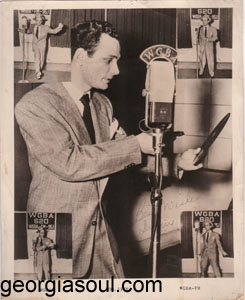 The
Ed Mendel Story
The
Ed Mendel Story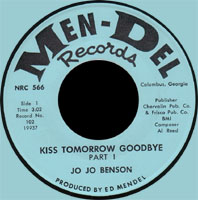 by
Brian Poust
by
Brian Poust
|
Go to Georgiasoul.com feature articles: Ed Mendel | Nathan Bartell |
 The
Ed Mendel Story
The
Ed Mendel Story by
Brian Poust
by
Brian Poust
"The clock on the wall says it's 4:05. Jump back and let's have some more jive!"
So began each day's broadcast of "In the Groove", hosted by WGBA-AM's Ed "Dr. Jive" Mendel, one of the most influential men in the Columbus GA music scene from the early 1940s until his death in 1975.
Edwin A. Mendel, Ed Mendel more casually or simply Dr. Jive if you were anywhere near where his airwaves reached. Born in October of 1919, Ed Mendel would embark on a radio career that expanded into record stores, concert promotion, artist management and record labels before his untimely death at the age of 55 from cancer. More than just a music industry career though, his groundbreaking involvement in the Columbus music scene touched the lives of countless people in the area, and the Black community in particular. Dr. Jive was the first R&B and gospel disc jockey in Columbus, the first stop shop to buy r&b records, and a highly respected employer.
Following the marriage to his wife Laurie in 1941, Ed shipped off for WWII service
with the Army, though his military stint would last only two years, when Mendel received a
medical discharge due to asthma. Already interested in radio,
Mendel started his broadcast career in Columbus, Georgia, but quickly made the
move to Atlanta with the help of a recommendation letter written for him by Allen
Woodall, Sr., owner of WDAK-AM. Mendel was hired by WAGA-AM in Atlanta,
where he originally worked for free, eventually getting his own time slot
for a short time. In 1946, Mendel moved back to Columbus.
He quickly made a name for himself at WGBA-AM and came to be known as "Dr.
Jive", playing jazz and rhythm and blues records to the Columbus GA and Phenix
City, AL communities through his show "In the Groove" each day from 4:05 to 5:00
pm. Like many radio DJs at the time, Mendel was selling his own ad time and his
pay was dependent on his ability to collect on his advertising contracts.
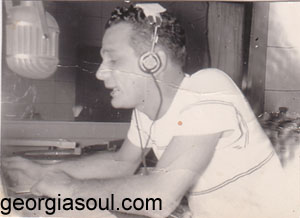 Due
to the popularity of "In the Groove", the show was eventually re-named "Dr. Jive",
after his on-air persona. Every day, Dr. Jive started his show with his
signature phrase, "The clock on the wall says it's 4:05. Jump back and
let's have some more jive!"
Due
to the popularity of "In the Groove", the show was eventually re-named "Dr. Jive",
after his on-air persona. Every day, Dr. Jive started his show with his
signature phrase, "The clock on the wall says it's 4:05. Jump back and
let's have some more jive!"
By the late 1940s, Mendel was in a good position to take advantage of his unique standing in the community and helped his parents, Esther and Max, start a record store called Dr. Jive's Record Shop at 817 8th Avenue in downtown Columbus. His parents were already running a general store at this location, when Ed started providing them with a small stock of records to sell, which eventually took over the entirety of their business. Through his radio show and feedback from his audience, Ed likely recognized that the music he was playing was not as available to the community, who were looking to buy the records they heard on the air each day. While Ed apparently had no direct or financial dealings with his parents record shop in the beginning of this venture, we must assume that the advice he gave to his parents about what to stock was invaluable. Beginning in the late 1950s, Mendel also started taking further interest in expanding his career beyond radio when he began working closely with the Columbus Municipal Auditorium to promote concerts. During the 1960s, Mendel brought in acts such as Sam & Dave, Jimmy Smith, The Impressions, Jackie Wilson, Aretha Franklin, James Brown and many more.
Following his stint at WGBA-AM, Mendel moved back over to WDAK-AM where he continued his Dr. Jive show, continuing to play rhythm and blues as well as jazz and gospel music. This was still the pre-integration period for the South and while it is clear that Mendel was a trail blazer in championing the music of Black musicians, Mendel's wife Laurie says she has very little recollection of any threats or unusual events coming from the white community of Columbus, despite Mendel's celebrity and the fact that segregation was a part of life in Georgia at the time. Mrs. Mendel only recalls a run-in that Ed had with a local policeman who told him, in no uncertain terms, that Mendel had better not let that policeman see him around his part of town again. Mendel then moved over to WOKS-AM (1) which was owned at the time by Johnny O'Shields and featured programming specifically catering to Columbus's black community. While at WOKS-AM, late in 1960, Mendel's father died. Ed took over ownership of Dr. Jives Record Shop.
By 1962, Mendel opened his second record shop at 1034 Broadway and expanded his stock. While the 8th Ave. shop continued to focus on jazz, R&B and gospel music, the Broadway location expanded to also carry more rock & roll as well as country & western. In addition to records, Mendel also expanded to selling portable record players, and other odds and ends which would attract a young clientele. Clearly, Mendel was keeping up with the teen market! In order to better run his two shops, Laurie Mendel ran the Broadway location, while Ed remained in charge at the 8th Ave. location.
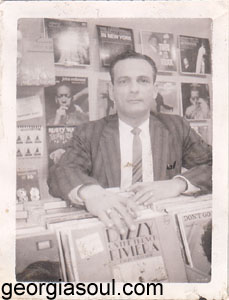
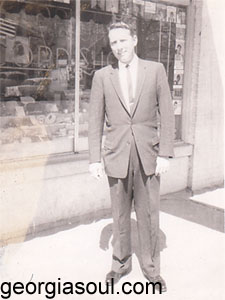
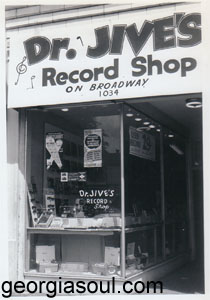
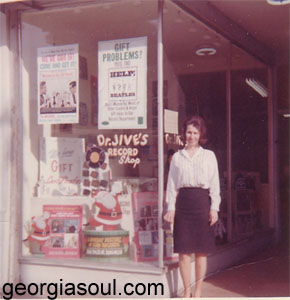
Mendel ended his "Dr. Jive" show circa 1967 to
embark on a new, business venture. With
help from Ben Parsons of Tomahawk Records, Mendel set up the Men-Del record
label and quickly gained local attention with his first two releases. The
first record on the label was Billy Reed's cover of the well-known Harmonica
Fats song "Tore Up", backed with the
original "Let Your Hair Down Baby", an incredible r&b instrumental
with pounding drums, horns, hand claps and bass guitar runs. It's a real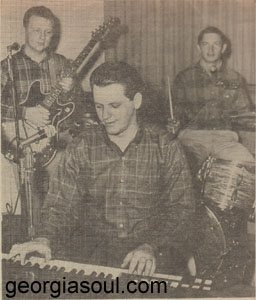 shame that it was never picked up for national distribution. The next
release was
the debut 45 by a young man from Phenix City, Alabama named Joseph Hewell, better
known as Jo Jo Benson. Benson's debut 45, "Kiss
Tomorrow Goodbye", parts 1 and 2 garnered immediate local attention. An August, 1967 article from The
Columbus News announced the new label, running pictures of Mendel and Benson. Within the next few months, Mendel scrapped his Men-Del label and established
his second label, Peggy Sue, named for his two daughters Peggy and Susan, both
of whom were also working in the Dr. Jive record shops. Susan, by this time, was
also writing newspaper columns geared towards teenagers for The Columbus
Ledger, letting them know what was hip and new in the teen scene.
shame that it was never picked up for national distribution. The next
release was
the debut 45 by a young man from Phenix City, Alabama named Joseph Hewell, better
known as Jo Jo Benson. Benson's debut 45, "Kiss
Tomorrow Goodbye", parts 1 and 2 garnered immediate local attention. An August, 1967 article from The
Columbus News announced the new label, running pictures of Mendel and Benson. Within the next few months, Mendel scrapped his Men-Del label and established
his second label, Peggy Sue, named for his two daughters Peggy and Susan, both
of whom were also working in the Dr. Jive record shops. Susan, by this time, was
also writing newspaper columns geared towards teenagers for The Columbus
Ledger, letting them know what was hip and new in the teen scene.
The Peggy Sue label released at least six 45s from late 1967 to early 1968 (2). The first 45 on the label was by a garage band called The Penny Saints, "Don't Sell Your Mind" b/w "Was It She" (1001). Following this initial release, Peggy Sue picked up some steam with singles that became very popular in the area. The Roy Hill Sextet received local air play with "Soulful Annie" b/w "I'm Your Puppet" (Peggy Sue 1003) which came immediately following Johnny Barfield Jr. & the Men from S.O.U.L.'s single "Mr. Starlight" b/w "Soul Butter" (1002). "Mr. Starlight" was written by Bobby Moore, a saxophone player from Montgomery AL. Moore had some success at Chess Records with his band The Rhythm Aces and a hit called "Searching For My Love" in 1966, as well as some other great records.
Johnny Barfield was a 21 year old mail carrier for the US Postal Service in Phenix City, Alabama at the time but also had a band with his friends Frankie Hurst (guitar) and Skip McQuin (drums) with Barfield playing a combo organ. A November 18, 1967 article appearing in The Columbus Ledger, quotes Barfield explaining the band's name. "We call ourselves The Men From S.O.U.L. The letters do not actually stand for anything but refers to 'soul' music". After quick local success, the Barfield single was picked up for national distribution by Shelby Singleton's SSS International label. The single failed to chart. However, Singleton also signed Jo Jo Benson - managed by Mendel - who had started singing as a duo with Peggy Scott of Florida. Their first single, "Lover's Holiday" went gold and started a successful run for the duo who performed together until 1971 on SSS International and Atco Records. The two got back together sometime in the 80s for an album on the Florida GCS label. Both artists still perform, and Peggy Scott-Adams has been recording somewhat prolifically since the 1990s from her home base in southern California.
The aforementioned "Soulful Annie" single by Roy Hill & the Swinging Sextet was picked up by the Minaret label based on its local strength, but went nowhere on the national charts. The Swinging Sextet's follow-up, "Us Don't Sop No Syrup" b/w "Doc, Take Two" (1005) is by far the superior of their two singles, one side a grinding r&b jam; the flip an upbeat instrumental that must have driven the kids into a manic frenzy when performed in the night clubs. This record also flopped. Sandwiched between the two Roy Hill & the Swinging Sextet singles was a nice deep soul single from Fletcher Flowers, "Comfort Me Baby" b/w "I've Got To Get Somebody" (1004). Fletcher Flowers was actually Fletcher Hewell, Jo Jo Benson's brother. In 1969, Mendel changed the numbering series for his Peggy Sue label, starting back at #1. That record was Beverly Hammonds's "I Wish It Would Rain" b/w "Darling Baby". "Darling Baby" is another fantastic Deep Soul 45 which was picked up for national distribution, released on New York's De-Lite label, #531. Both songs, by the way, are Motown covers. "Darling Baby" was originally by The Elgins, while "I Wish It Would Rain" was a Motown standard made a huge hit by Temptations before everyone else had a turn with it. Beverly had earlier been a gospel singer and sang lead on a 45 on Columbus's Tomahawk label by The Dynamic Gospel Gems, "The Storm Will Pass Over" b/w "In My Father's House" (Tomahawk 192). Hammonds was singing at the big Columbus night club at the time, The Lavana Club, with an R&B group called The Kayo's when Ed Mendel first heard her sing, which is very likely how Mendel was also introduced to Roy Hill and his group, not to mention Jo Jo Benson. As it happens, Peggy Scott was singing with Roy Hill's Sextet in the same club around that time shortly before teaming up with Jo Jo Benson.
The Beverly Hammonds 45 was produced by southern soul legend Roscoe Robinson, who recorded at Muscle Shoals during the 1968/69 time frame despite living in Chicago at the time. Mendel had at least one other collaboration with Roscoe Robinson when in 1969, Robinson released a 45 by The Sextette Unlimited, "Boot That Thang" parts 1 and 2 as the third 45 on his own label, Gerri. This song was published by Ed Mendel and produced by Robinson for Ed Mendel Productions. Following their 45s on the Peggy Sue label, The Roy Hill Sextet broke up, but some members reformed under the new leadership of drummer Paul Brown, calling themselves The Sextette Unlimited. Roscoe Robinson had other ties to the Columbus area, as a one time member of gospel group The Five Trumpets, who recorded at least two singles for the Tomahawk label, one in 1967, the other circa 1972/3. It is unlikely that Robinson sang on those specific records, but is interesting trivia nevertheless.
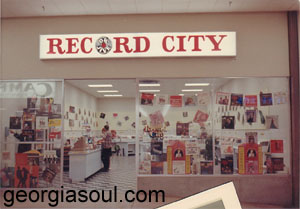 On
the record store front in 1968, Mendel hired store managers for both locations
from the Black community which, again, was a bold step forward for the time,
when African-Americans in Columbus were having a very difficult time finding
good jobs. In addition to showing support to the Black community, the
added staff enabled Mendel to open a third store called Dr. Jive's Record City at
Columbus Square. The Columbus Square location was quickly followed by a
fourth location at Cross-Country Plaza. Mendel bought a large
advertisement in The Columbus News proclaiming "Democracy Works Here!"
showing his proud store managers, Johnny Pittman at Broadway, Rip Love at 8th
Avenue and new employee Willie Harris with daughter Susan Mendel also at the
Broadway location.
On
the record store front in 1968, Mendel hired store managers for both locations
from the Black community which, again, was a bold step forward for the time,
when African-Americans in Columbus were having a very difficult time finding
good jobs. In addition to showing support to the Black community, the
added staff enabled Mendel to open a third store called Dr. Jive's Record City at
Columbus Square. The Columbus Square location was quickly followed by a
fourth location at Cross-Country Plaza. Mendel bought a large
advertisement in The Columbus News proclaiming "Democracy Works Here!"
showing his proud store managers, Johnny Pittman at Broadway, Rip Love at 8th
Avenue and new employee Willie Harris with daughter Susan Mendel also at the
Broadway location.
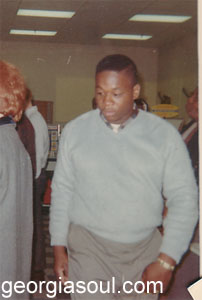
With four local record shops by the end of the 1960s, Mendel established himself as Thee Columbus source for records both new and used, as well as 8 track cartridges of every genre. Now retired from radio, Ed Mendel was able to fully devote his energies to show promotion and his record shops. Wendell Parker, owner of Shurfine Records in Atlanta from 1966 to 1972 remembers that Mendel was an important record dealer at the time. When asked about the Dr. Jive record shops, Parker said "I remember we had to keep shipping more copies of Hannibal's 'Hymn No. 5' out there to them. If he sold one copy, he sold a thousand!" Likewise, Laurie Mendel remembers long lines at the stores when Peggy Scott & Jo Jo Benson's "Lover's Holiday" was first released.
In 1972, Ed Mendel got his first and probably only real competition in the record store market. Flipside Records was opened by Ronald and Dot Morris in the Heritage Corner shopping center. Dot remembers that early one morning while she was making preparations to open the store, she noticed Ed Mendel and one of his employees peeking through the front window. When she looked over towards them, Ed darted off as to not be seen. She approached his employee and asked if she could help him to which he replied "No, I'm just looking." Dot smiled when recounting that about a week later, Flipside received a note from Ed saying that he would either run them out of business or buy them out. Later on, Ronald Morris became good friends with Ed Mendel and they spoke often before Ed's death in 1975. Ronald passed away in the early 1990s, but Dot continues to run Flipside Records in it's same location to this day with her son in law.
Talking to people today who knew Ed Mendel, it is evident that the man made quite an impact on his community, especially to be remembered so fondly by so many people, from artists to other record industry people to his own competition. Mendel's impact on Georgia Soul music was not just limited to the Columbus area and is a man worth remembering, as are some of the other great R&B radio DJs who were Mendel's contemporaries. In Ed Mendel's honor, we also tip our hat to the careers of The Duchess, Hound Dog, The Deuce and all the rest who brought some great R&B to the airwaves of southwest Georgia!
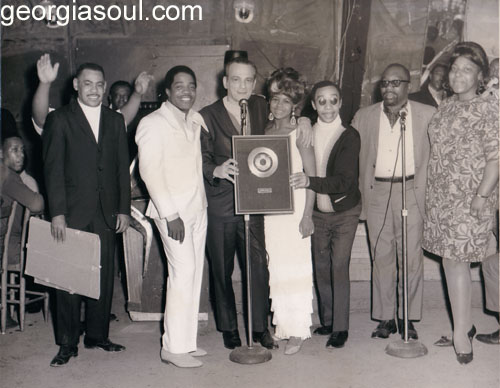
left to right: Rudy "The Deuce" Rutherford, Jo Jo Benson, Ed Mendel, Peggy Scott, Hound Dog, Warren "The Baron" Palmer, Earnestine Mathis
Georgiasoul.com very graciously acknowledges the invaluable assistance of Laurie Mendel in the preparation of this article. Mrs. Mendel's stories and scrapbook attest to the great legacy of Edwin A. Mendel. If there are any old radio buffs who read this article, we would love to hear any old air check tapes that might still be in existence. Thanks and much appreciation to Michael Sapp for recent corrections to the attendees shown above at the presentation of Peggy Scott & Jo Jo Benson's gold record (6/12/06).
(1) WOKS-AM can still be heard playing old school R&B at 1340 on the AM dial in Columbus, Georgia.
(2) There were possibly three other releases on the Peggy Sue label. Catalogue numbers 1007 and #2 have been seen, but as of yet, no 45 bearing the 1006 catalogue number has been documented as found in research for this article. We are interested in copies of all three of these records for our archive.
©2004-2007 Georgiasoul.com No part of this web page or its contents may be copied without written consent from Georgiasoul.com